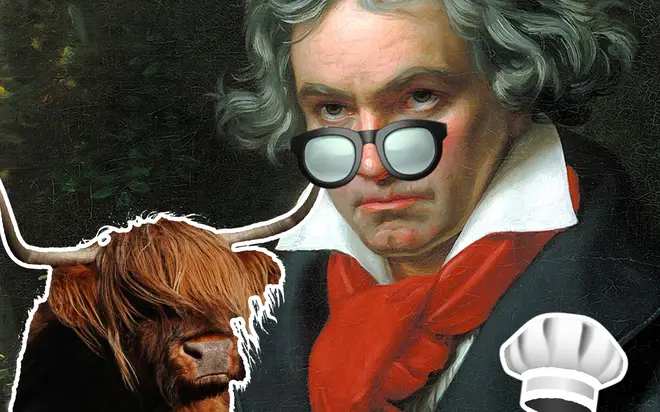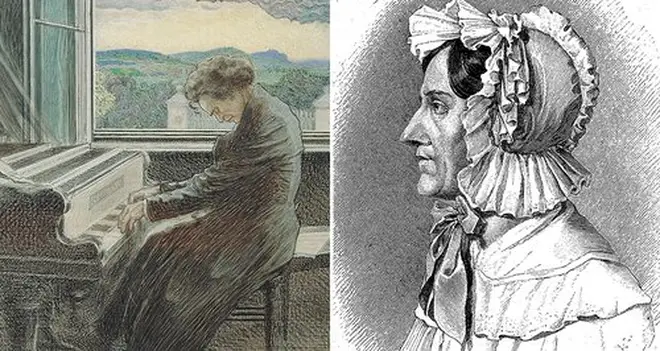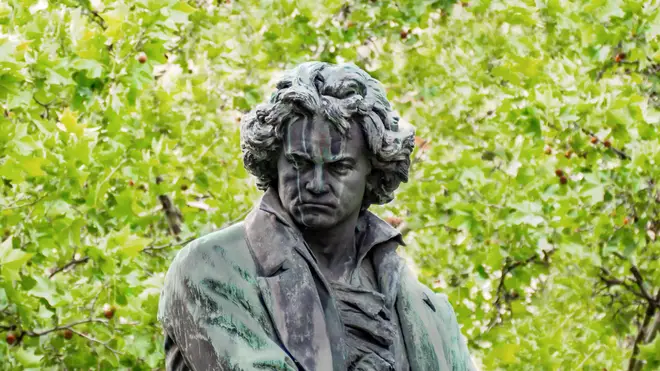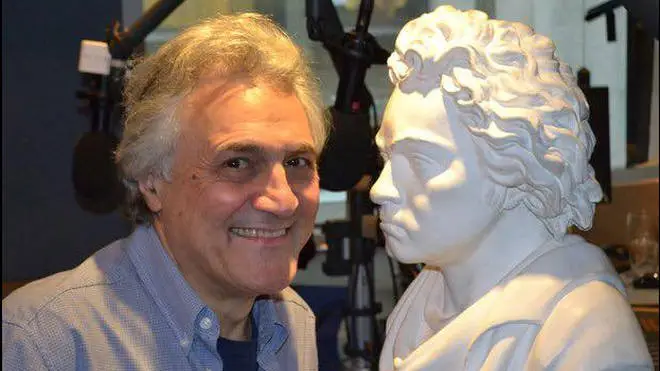On Air Now
Relaxing Evenings with Zeb Soanes 7pm - 10pm
26 November 2020, 13:26 | Updated: 25 January 2021, 10:33

Such was the power of Beethoven’s music that it’s known to have made a whole herd of oxen stampede. That – and so much more...
Ah Beethoven.
The very pinnacle of the Classical era, and the revolutionary who sparked the Romantic period – with its tempestuous symphonies, tortured, soul-searching songs and explosive piano music – that in turn exploded its composer-performers like rock stars into an adoring public.
We may think we know Beethoven – the nine symphonies, the piano music that changed everything, the tragic loss of hearing.
But there is plenty we don’t know. And we’ve loved learning about Beethoven more this year than ever – through events marking the 250th anniversary of his birth, and through Classic FM presenter, John Suchet’s, historic year-long radio series, Beethoven: The Man Revealed.
So, without further ado, here are 25 things you might not know about the great LVB...
Read more: See Beethoven’s ‘real’ face in artist’s 3D colourised portraits >

Pianist creates mesmerising visualisation of Beethoven’s Moonlight Sonata
Nobody is actually sure of the date of Beethoven’s birth – we do know he was baptised on 17 December, so he was probably born the day before. And we’re sticking with it.

Beethoven's 5th, conducted by a 3-year-old boy
Far from being a prodigious only child, Beethoven had seven brothers and sisters – Kaspar Anton Karl, Nikolaus Johann, Ludwig Maria, Maria Margarita, Anna Maria Francisca, Franz Georg, and Johann Peter Anton Leym... van Beethoven. Sadly, four of Beethoven’s siblings died young.
Beethoven’s nickname at school was ‘Der Spagnol’ (‘The Spaniard’), because of his dark complexion. It is highly likely he had Moorish blood from an ancestor serving in the Spanish army when they occupied the Netherlands.
Read more: Was Beethoven Black? Twitter debates the composer’s heritage >

Watch this guy's INCREDIBLE solo guitar arrangement of Beethoven’s Fifth Symphony
Beethoven supposedly had a ‘mother figure’ in Nannette Streicher, and she was a renowned piano builder who made instruments for the great composer.
Read more: Meet Nannette Streicher, ‘the woman who built Beethoven’s pianos’ >

Beethoven, at 19 the youngest member of the court orchestra on a yacht trip up the Rhine to the Prince-Elector’s summer palace, was appointed kitchen scullion, the lowliest job. Beethoven the kitchen porter? We’re having a hard time imagining...
When Beethoven was forced to wear spectacles like one of his friends, a cellist, he wrote ‘Obbligato for Two Pairs of Spectacles’ for them to play together.
When he was young, it was Beethoven’s ambition to meet the great Classical composer, Mozart, and he went to great lengths to do so – only to be received by a moody Mozart who didn’t relish having to stop work to hear a supposed ‘prodigy’.
When Beethoven began performing Mozart’s own Piano Concerto No. 24 in C minor, the latter said, “Not that... Play something of your own.” So Beethoven did – and it went down so well that Mozart said, “Watch out for that boy. One day he will give the world something to talk about.”
And here we are! Reminds us of an X Factor audition...
Beethoven’s favourite tavern was the Schwann Inn in the Neuer Markt in Vienna, where he would drink local red wine and purchase an already filled pipe.
Beethoven’s famous ‘Eroica’ Symphony No. 3 was inspired by and originally dedicated to Napoleon Bonaparte until the composer, disenchanted with Napoleon’s colonial ambitions and decision to call himself ‘Emperor’, struck out the dedication. Instead, he dedicated the symphony to the ‘memory of a great man’.

Beethoven proposed marriage three times that we know of. He was turned down each time. One intended bride said he was ugly and half crazy. Another had a pet dog, Gigons, who Beethoven said was more affectionate towards him than she was. Poor Beethoven.
Beethoven was arrested for being homeless after he was seen, in tattered overcoat, staring through people’s windows.
Opera has been a pretty big deal since the Baroque era. But, did you know, that among his accomplishments Beethoven only wrote one opera in his lifetime – Fidelio, which took Beethoven three versions, four foes at the overture, and umpteenth stabs at certain arias, to get the thing right.
In the final year of his life, striding across a field, gesticulating wildly as he composed in his head, Beethoven caused a herd of oxen to stampede.
Read more: Man in black tie plays the piano to a whole flock of sheep >
Beethoven’s ‘late’ string quartets especially challenged listeners in his own day – in fact, the composer Spohr called them “indecipherable, uncorrected horrors.” Nowadays they’re considered among the greatest works of all time.
It’s the UK’s own Royal Philharmonic Society (RPS) that we can thank in part for the existence of Ludwig van’s famous final symphony. RPS commissioned the work in 1817 and continues to champion Beethoven’s and other great composers’, performers’ and orchestras wonderful work today.
Read more: Become a member of the organisation that commissioned Beethoven’s Symphony No. 9 >
At the end of the first performance of the 9th Symphony the Choral - Beethoven still conducting the imaginary orchestra in his head - there occurred a moment so poignant it is impossible to describe without a lump in the throat. Beethoven - The Man Revealed @ClassicFM now. pic.twitter.com/ESK3dybBnC
— John Suchet (@johnsuchet1) November 21, 2020
There were so many squabbles, disagreements, and last-minute walkouts ahead of the premiere of Beethoven’s final symphony that we’re lucky it even happened at all – just imagine that.
The mighty Beethoven - composer of the Choral Symphony. It wasn’t like that all - and he looked nothing like that. Petty squabbles, disagreements, last minute walk outs - the premiere of the 9th nearly didn’t happen. Full story on Beethoven - The Man Revealed 9pm @ClassicFM pic.twitter.com/I9LyXcMFDy
— John Suchet (@johnsuchet1) November 21, 2020
At the end of the very first performance of his Symphony No. 9 the great conductor as composer stayed conducting the imaginary orchestra in his head long after the performance had finished – a moment so poignant that our own John Suchet has said it’s “impossible to describe without a lump in the throat”.
Beethoven wrote nine symphonies, and started a bit of a tradition of Romantic composers writing nine symphonies (no more, no fewer). The likes of Schubert, Mahler, Bruckner, Dvořák, and Mahler all being among those leaving behind them just nine symphonies, too, has created the myth of the ‘Curse of the Ninth’.
Read more: What is the ‘Curse of the Ninth’ and does it really exist? >

Watch This Incredible Beethoven 'Ode to Joy' Flashmob
Beethoven died in Vienna on 26 March 1827 after a long illness that has variously been attributed to alcohol, hepatitis, cirrhosis and pneumonia.
At the moment of his death there was a clap of thunder. Beethoven raised his arm, fist clenched. A last defiant gesture against fate, says the legend. Actually it was a muscle spasm brought on by the disease that most likely killed him, cirrhosis of the liver.
Thousands of people lined the street for Beethoven’s funeral, including some very influential composers such as Franz Schubert, Johann Nepomuk Hummel and Carl Czerny.
A recording of works by Beethoven, among many others, was once hurtling around space, carried on the Voyager space craft 11 billion miles away from Earth, as part of a ‘golden record’ presented by planet Earth to the universe.
Beethoven’s Fifth Symphony is one of the most recognisable pieces of classical music out there (ba-ba-ba-bam!), and it’s in many films and other soundtracks – but did you know it makes a sneaky appearance in 1977’s glitzy Saturday Night Fever?
Beethoven’s so often found to be the most-performed composer in classical concert halls that we’ve stopped counting – and in 2019, over 13 percent of concerts featured music by Beethoven.
Beethoven aficionado and Classic FM presenter, John Suchet, made radio history in 2020 when he launched his year-long, weekly radio programme dedicated to dramas, loves, conflicts and successes of the extraordinary and complicated musical genius that is Beethoven – the biggest UK radio series of its kind. John has also written a book about the man.

Join us for Classic FM’s Big Beethoven Celebration on 16 December. Classic FM is available across the UK on 100-102 FM, DAB digital radio and TV, at ClassicFM.com and on Global Player, the official Classic FM app.